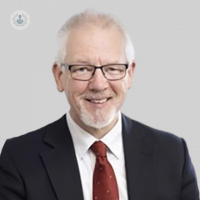Ask an orthopaedic surgeon about shoulder pain and arthritis
Written by:Shoulder pain can affect you at different stages in your life, whether it is due to injury or general wear and tear, and sometimes shoulder pain can be a result of arthritis. Find out more about shoulder pain and arthritis from top orthopaedic surgeon, Mr Simon Lambert.

What are common causes of shoulder pain?
The common causes of shoulder pain are injury to the shoulder and the shoulder girdle throughout life. Each decade of life has a slightly different prevalence of causes of shoulder pain. For instance, in adolescence, a teenager with shoulder pain normally has instability of the shoulder rather than any degenerative problem. As we get older, in mid-to-late adult life, we start to get wear and tear of the tissues around the shoulder (the rotator cuff) and, therefore, problems of rubbing or pain generated by the tissues become more common.
As we get into later middle age, tearing of the tissues can occur, and this, in addition to rubbing, causes pain in the shoulder. As we get into the fifth and sixth decades, we get arthritis of the shoulder and the shoulder girdle, which causes pain and as we get to mid-to-late middle age, our neck becomes stiffer and then the nerves from the neck can be compressed or irritated, giving rise to what we think of as shoulder pain, but is actually neck pain. Finally, in senescence, old people who are frail or elderly or malnourished can sometimes attribute their shoulder pain to infection.
Each decade has its common causes but overall, we must think about infection and injury as common causes of shoulder pain throughout life.
What are the main causes of arthritis?
There are three main causes of arthritis in the shoulder. About a third of us have arthritis as an inherited or genetic predisposition from our parents or families, which means it may have something to do with how our shoulders are built when they are being developed in the womb. Another third of us develop arthritis in the shoulder because of damage to the articulating surfaces which causes wear and tear over time. A final third of us have a chemical change in the cartilage surfaces so that the cartilage becomes less resilient to movement and so it wears out over time.
Can you prevent arthritis?
It is actually quite difficult to prevent arthritis of the shoulder if we are genetically predisposed to it or have injured our shoulder, causing damage to the articulation surface. However, what we can do is reduce the rate of degeneration or reduce the effect that that degeneration has on the shoulder by keeping the shoulder as supple and strong as possible. We do that through carefully monitored and executed exercises.
If we do develop arthritis, we can ameliorate the symptoms with things like omega and glucosamine medication and injections into the joint of a similar type.
Anti-inflammatory medication can be very helpful in reducing the associated inflammation of the membrane of the joint, which in turn reduces the degradation of the articulation surface by enzymes produced by the membrane. Therefore, careful use of anti-inflammatories is helpful as we can reduce the rate of wear and tear, however, it is important to note that we cannot always stop it happening in the first place.
Who is at risk of getting arthritis?
Some people are born with an inherited tendency to develop arthritis. That is about a third of the people who eventually have arthritis of the shoulder have a predisposition to it and we don't quite understand why. However, the majority of people who develop arthritis of the shoulder are:
- People with inflammation of the joints (rheumatoid arthritis);
- People who have injured their shoulder joint through sports or trauma;
- People who have developed weakness and tearing in their shoulder because of general wear and tear (e.g. cuff tear arthropathy).
There are people in different categories of risk, the most important of which is probably injury.
If you would like to find out more, make an appointment with a specialist.


